Purslane turnovers (Fatayer bel-bakleh)
August 30, 2012 • Category: Mezze/Appetizers
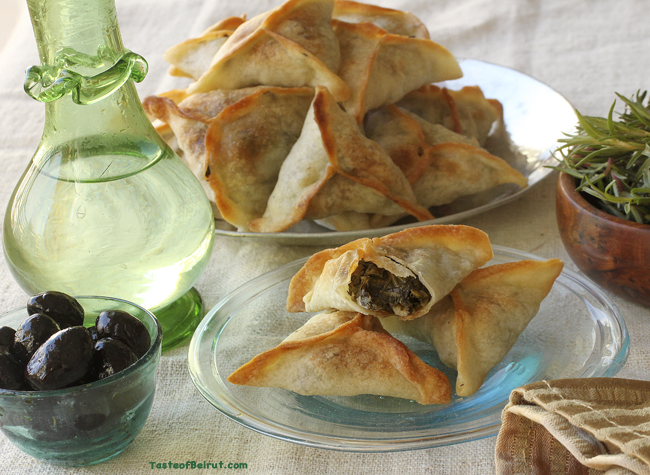
Fatayer as they are called here belong to the category of savory pastries and can be found at every corner bakery in Beirut and throughout Lebanon. Their taste and quality varies, of course. You can make them with store-bought dough, even frozen biscuit dough in a can; or you can devote 2 or 3 hours on a weekend and make them from scratch.
Which ones do you think you (and your family or friends) would enjoy more?
I have discovered that the best ones are stuffed with fresh greens, be it spinach, or purslane or any other greens. No need to cook them beforehand!
The greens are washed and dried and macerate in salt for 30 minutes; the salt draws out their water, they are squeezed dry again and dressed with sumac, chopped onion, lemon juice and olive oil.
Another discovery: If you are using fresh greens, keep the stems; chop the stems along with the leaves.
Purslane aka bakleh is invading all of the kitchen garden; since it is a super nutritious green, why not use it to make these fatayers? You can also use dandelions or wild sorrel leaves, collard greens or turnip greens, swiss chard or anything green.
INGREDIENTS:
- 3 cups Flour 00 (all-purpose will be fine)
- 2 cups cake flour (can be substituted for all-purpose)
- 1 Tablespoon of dry yeast (optional)
- 1 Tablespoon sugar
- 2 teaspoons salt
- 3/4 cup oil (canola, or olive oil)
- 1 1/2 cups water
STUFFING:
- 2 pounds of purslane, stems removed (NOTE: Can substitute spinach, collard greens, beet greens or any other wild or cultivated greens)
- 4 medium onions (about 12 oz.)
- 1/4 cup sumac
- 1 teaspoon paprika
- pinch of cayenne (optional)
- 1 Tablespoon salt
- 1/2 teaspoon black pepper
- 1/3 cup pine nuts (optional)
- Dressing for the stuffing:
- 1/4 cup lemon juice (bottled is OK)
- 1/4 cup extra-virgin olive oil
- 1 or 2 Tablespoons pomegranate molasses
METHOD:
1. Start by making the dough. Proof the yeast with 1/4 cup of warm water and 1 teaspoon of sugar. While waiting for the yeast to proof, mix the oil with the flour (or flours, if using more than one type), salt and sugar in a mixer fitted with the dough hook or by hand. When the yeast has bubbled, add it to the flour mixture, and mix in the water gradually. Knead the dough until it is as smooth as baby skin. Let it rest for one hour or more, while you mix the stuffing.
- 2. Make the stuffing: Chop the onions very fine and place them in a bowl. Sprinkle with salt and set aside for 30 minutes. Make the dressing: mix the oil, lemon juice and pomegranate molasses in the quantities suggested.
- Wash and drain the greens; place in a chopping board and cut in small shreds including the stems. Sprinkle with salt and leave for 30 minutes; then squeeze to drain the greens of any extra water and transfer to a bowl; add the dressing and toss to mix. Squeeze the onions dry and add them to the purslane along with the pine nuts.
- Cut the dough in half and spread it on a cold and greased counter as thin as possible, about 1/16 of an inch. If you can’t make them that thin, it is OK, just don’t make them too thick (no more than than 1/8in)
- Cut rounds with a 4 in. cookie cutter and start spreading one tablespoon of stuffing on each fatayer.. Lift the fatayer and pinch 2 ends first and then the third to form a pyramid.
- Place them in greased cookie sheets and bake them after 20 minutes in a preheated oven at 375F for about 15 to 20 minutes or until the top and bottoms are golden. Check after 10 minutes to make sure they don’t burn.
- Cool and eat at room temperature or slightly warm. These can be frozen for two weeks.
NOTE: You can make the dough and skip the yeast; they will turn out fine.
Comments
38 Comments • Comments Feed

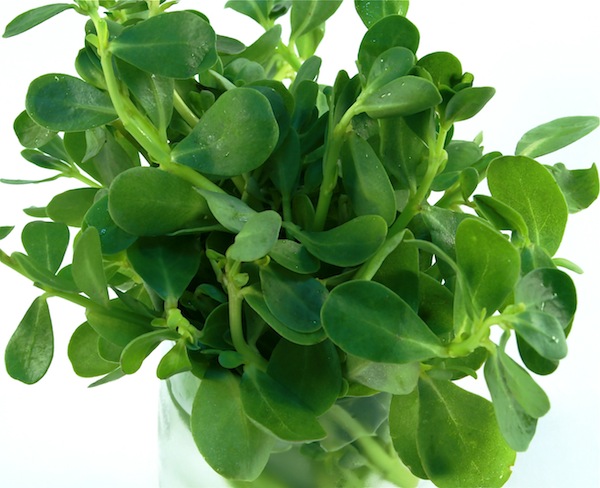
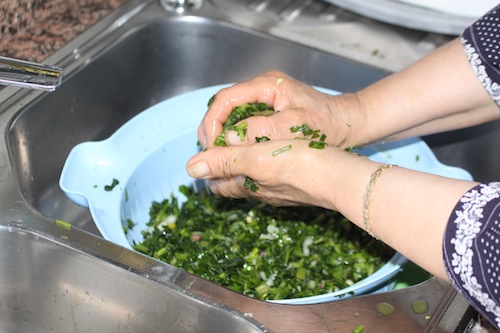
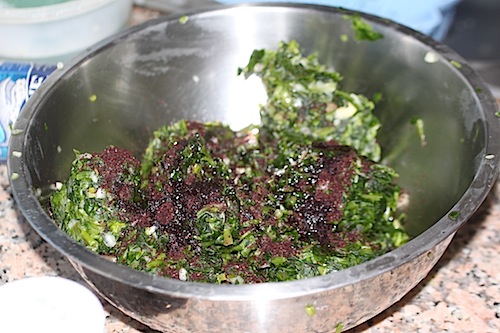

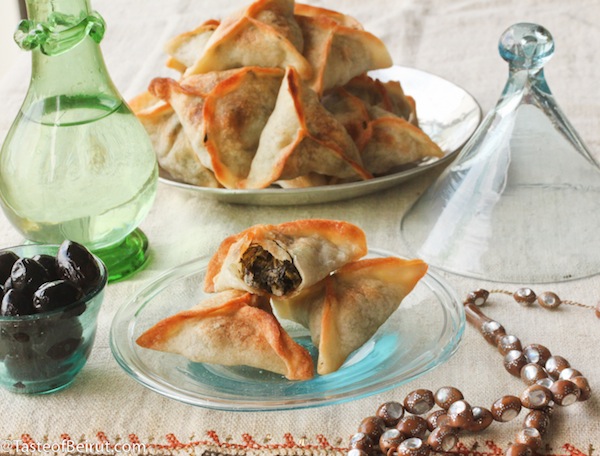
Pam says:
These look so good. I have a little list I am starting to surprise my son’s girlfriend with a Lebanese meal. I have no clue what I am doing, but am a well practiced cook. Thanks for such a wonderful website
Pam
On August 30, 2012 at 6:49 am
Rosa says:
Great filling and wonderful turnovers!
Cheers,
Rosa
On August 30, 2012 at 6:54 am
emile says:
Just finished eating the last one, and if you’re lucky enough to live in Beirut or anywhere in Lebanon just head down to your local bakery and they will provide the dough and bake it for you just 5 (large size) for a dollar you need only supply the stuffing. In Australia the Lebanese bakeries are doing the same thing now.
On August 30, 2012 at 6:55 am
verkin10 says:
I have Purslane in my garden and use it for salads, never thought I could use it for
turnovers, thank you so much for the recipe.
On August 30, 2012 at 7:45 am
Lyndsey@TinySkillet says:
First off I just love that first photo it really makes me want to be there to enjoy that lovely plate of savory pies. I just love savory pastries, and I am excited to try making these. I want to find more ways to use pomegranate molasses and all that sumac that I have. Now I just wish I had purslane in my garden! 🙂
On August 30, 2012 at 8:04 am
Happy Cook / Finla says:
Wowo that looks super yummy, wish i could have them right now.
On August 30, 2012 at 8:23 am
Belinda @zomppa says:
Beautiful! The molasses must add that perfect tanginess…and the pastry looks wonderful!
On August 30, 2012 at 8:25 am
sharon cory says:
I’m really enjoying these recipes. I’m of Lebanese descent and we had some of these foods growing up, but you’ve added so much to my knowledge. What is sumac? I’m in Canada and I’ve never seen this for sale. Is it the fruit of the sumac tree? Is there a dry substitute? Thanks so much.
On August 30, 2012 at 11:39 am
Joumana says:
@Sharon: Sumac is a bush that grows in Lebanon and throughout the Levant; it is NOT the same sumac that grows in North America which is poisonous; sumac is used here to give a lemony flavor to food; I have a post on sumac showing the actual “fruit” which is dried and ground into a powder; you will find sumac available in any Middle-Eastern grocer or online; it is used on a lot of things famously in fattoush salad (as part of the dressing), as a component of zaatar, in a vegetarian kibbeh called zingol and to flavor stuffings for stuffed veggies etc.
https://www.tasteofbeirut.com/2012/06/mysterious-plant-edible/
On August 30, 2012 at 11:51 am
Elena says:
Joumana, it’s sounds, as usual, so tasty! One question- isn’t a dough under a filling became a little “moist”.? I hate such layer a dense wet dough, so i would prefer to put a piece a very thin substance ( such as a brick pastry) under the green juicy filling.
On August 30, 2012 at 12:15 pm
Joumana says:
@Elena: the key is to drain it enough so it does not get the dough soggy, but not too much.
On August 30, 2012 at 2:50 pm
T.W. Barritt says:
No need to cook the greens in advance? That’s excellent! I love little savory pastries!
On August 30, 2012 at 3:25 pm
sharon cory says:
Thanks so much. There are several Middle-Eastern grocers where I will check for sumac.
Sharon Cory
On August 30, 2012 at 5:09 pm
Katie@Cozydelicious says:
I recently discovered that I love purslane. These turnovers look wonderful!
On August 30, 2012 at 7:00 pm
Cherine says:
I love fatayars be ba2leh… yours look crispy and delicious!
On August 30, 2012 at 11:14 pm
samir says:
.great pics and post… a classic and delicious. and ur so right the quality can vary greatly.,..but urs look exquisite…..i esp love them with swiss chard or spinach
On August 31, 2012 at 2:00 am
usha says:
These look delicious. It’s not difficult to see why they are so popular. In fact, they closely resemble their cousin, the Indian ‘samosa’. Samosas and are street food and I have yet to meet an Indian who does not love them.
Thanks Joumana for yet another brilliant post.
On August 31, 2012 at 5:37 pm
Jamie says:
These look so good, Joumana! And the dough looks so perfect, light and crispy. I have to try this. I love the filling, too. I usually make a classic spinach-feta but the purslane-pom molasses sounds wonderful!
On September 1, 2012 at 5:07 am
Pamela Heiligenthal says:
I had to comment when I saw these because I recently searched for the perfect pairing for Phyllo Triangles with Collard Greens and found that Grüner Veltliner was a perfect match! I’m excited to try this recipe. Try the Phyllo Triangles with it as well, I think you will love them (look for it on page 47).
On September 1, 2012 at 7:03 pm
Joumana says:
@Pamela: Thanks for sharing I will certainly try them!
On September 2, 2012 at 1:40 am
Julie Nathan says:
Just made these and they are delicious indeed. Couple suggestions/notes:
1) you forgot to add the step with adding the sumac/paprika in. I assumed it was mixing it in after the dressing
2) the dough is nice and soft and pliable ONCE. A second roll is tough – the dough gets tough. What I found worked well (after a bit of frustration with the first half) was to break off golf-ball sized pieces of dough and roll it out individually. Much easier in the long run
3) I used fresh yeast. Don’t. Dough gets really too puffy and overwhelms the filling.
4) I found it was helpful to fork the edges closed otherwise they tend to come apart in the oven. They still split a bit, but in a nice way, when forked.
All in all, many many thanks for the recipe – I made half of them with a mixture of lamb and the greens, and these are also delicious.Will be making them again.
On September 2, 2012 at 4:03 am
Joumana says:
@Julie: Thanks for the great tips! I will correct the omission and you are right, the dough does tend to get tougher and I have tried to circumvent this by cutting as many fatayers as possible on the first roll out so that i don’t have a lot of dough left; also, I don’t use yeast, which is the original way I was taught this recipe; I know a lot of people in Lebanon use yeast, but it really is not necessary with this type of pastry.
On September 2, 2012 at 2:13 pm
Michael Kplus says:
Dear Joumana,
I recently found your blog and this is the first recipe I tried. It is truly wonderful. I wanted to try fatayer for ages. I saw an interesting version in Greg and Lucy Malouf’s “Saha” which had one with duck meat and spinach, but haven’t tried it yet. I have never tried purslane, so I thought I will try your fatayer recipe. I also experienced problems with rolling out the dough as Julie Nathan described…maybe I should have read all the comments. But I didn’t mind. When I rolled out the second half of the dough I made sure to cut out as many circles as possible. Unfortunately I was not so skilled at sealing the pastries properly. The filling leaked out a little bit during the baking. Still, they were lovely. I also tried beet leaves as suggested and will try dandelion soon. I will also give the sans-yeast dough just to see the difference. And eventually I will become better at sealing the fatayer.
I am so excited now that I will try your oatmeal date squares next. https://www.tasteofbeirut.com/2012/08/oatmeal-date-squares/
We have had some intense weeks with a project at work and on Wednesday that will be over. I thought this would be a good opportunity to celebrate with coffee and some of those squares. 🙂
On September 3, 2012 at 5:23 am
Joumana says:
@Michael: Regarding fatayers, the more you make them, the better they will turn out; I’d recommend trying the dough minus yeast, since this is what I have been advised to do by a master fatayer maker in Beirut. The oatmeal squares should be a lot easier, I made them as a whim with no recipe beforehand. Thanks so much for sharing your experience with us!
On September 3, 2012 at 7:45 am
Tom Tall Clover Farm says:
Joumana, fatayer is one of my favorite Lebanese dishes, though I’ve never had the vegetarian option — so now I do, thanks!
On September 6, 2012 at 6:30 am
Michael Kplus says:
Thanks Joumana, for your encouragement. 🙂 I will try the fatayer again without yeast in the dough and try a filling of dandelion and chopped hazelnuts (instead of pine nuts).
On September 9, 2012 at 5:10 am
Yasmeen says:
Fantastic, Joumana. I’ve just made fatayer myself, funny enough, with a combination of spinach, kale and silverbeet greens we plucked from our garden.
On September 9, 2012 at 6:36 am
Joumana says:
@Yasmeen: sounds really good with that combo and fresh from your garden, wow!
On September 9, 2012 at 2:43 pm
domi says:
Délicieux petits tricornes gourmands….
On September 10, 2012 at 10:52 am
Vanita says:
Hi Joumana,
Have you managed to find srrel here?
I have looked a lot and am unable to do so.
Please do let me know where if you did find it.
Thanks,
Vanita.
On October 9, 2012 at 11:28 am
Joumana says:
@Vanita: No I have not; I ‘d ask at farmer’s markets or stands or just plant it in my backyard!
On October 9, 2012 at 11:43 am
Maysa says:
Joumana,
What a pleasant surprise. First, you Are Lebanese and second in you live in dallas. I’m Jordanian who lives in the dfw area. It’s a breath of fresh air to read about some Lebanese recipes.
I love bakleh, I’ve only made it as a salad but to think that it can be cooked like spinach is pretty interesting and mouthwatering too. Gotta try the recipe.
Keep up the good work dear 🙂
On December 12, 2012 at 8:50 pm
Marilyn says:
Hello Joumana, I love your site! I’m a Lebanese married to a French guy and living in France, and I always come here for tasty recipes, especially when I’m homesick.
Your pumpkin kibbeh is a huge hit in this house! 🙂
We have a guest coming over for lunch in a couple of days and he is not really into meat, and I have a nice bunch of swiss chard in the fridge, so I thought I’d make him taste some fatayer.
I also happen to have a nice bunch of purslane.
Do you think I can mix swiss chard with bakleh? Or will it mess up the taste?
On March 4, 2013 at 7:45 am
Joumana says:
@Marilyn: Thanks for your praise, it is a great pleasure of mine to meet you through the blog. As far as mixing purslane and swiss chard, I have never done it but the idea sounds wonderful!!!! Let me know how it turns out. I have only seen one or the other here in Beirut, but I think you should not have any problem. Or, you can leave the purslane for fattoush or ayran bel bakleh!(a salad of purslane and yogurt, recipe is on the blog)
On March 4, 2013 at 9:15 am
md : dulal abu kalam says:
Fatayer makier k
uwait my call no +965 97484658 )(+965 66830273 ) nationality bangladesh working fatayer 12 year,good work thanking you
On June 5, 2013 at 5:52 am
md : dulal abu kalam says:
Fatayer working in kuwait
On June 5, 2013 at 6:00 am
Rose says:
Help me find purslane , please.
On December 7, 2014 at 5:22 pm
Joumana says:
@Rose: Where do you live?
On December 7, 2014 at 11:12 pm